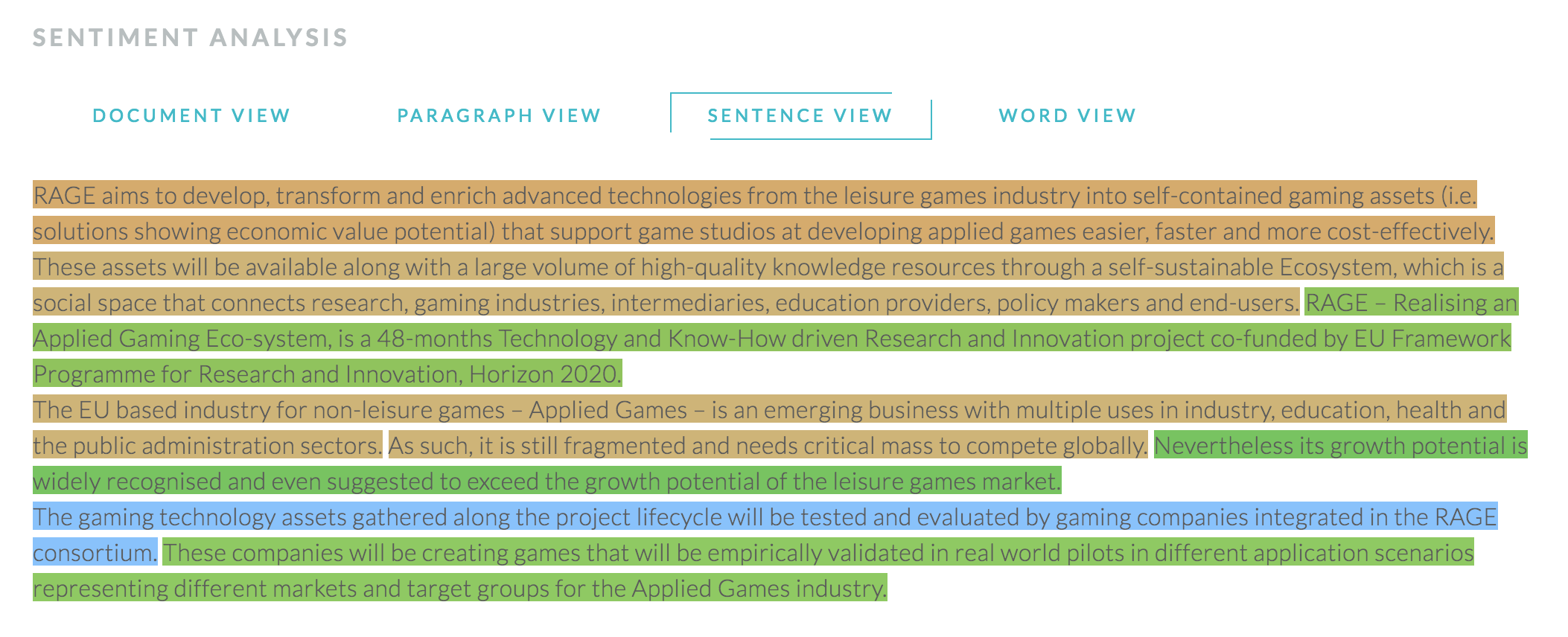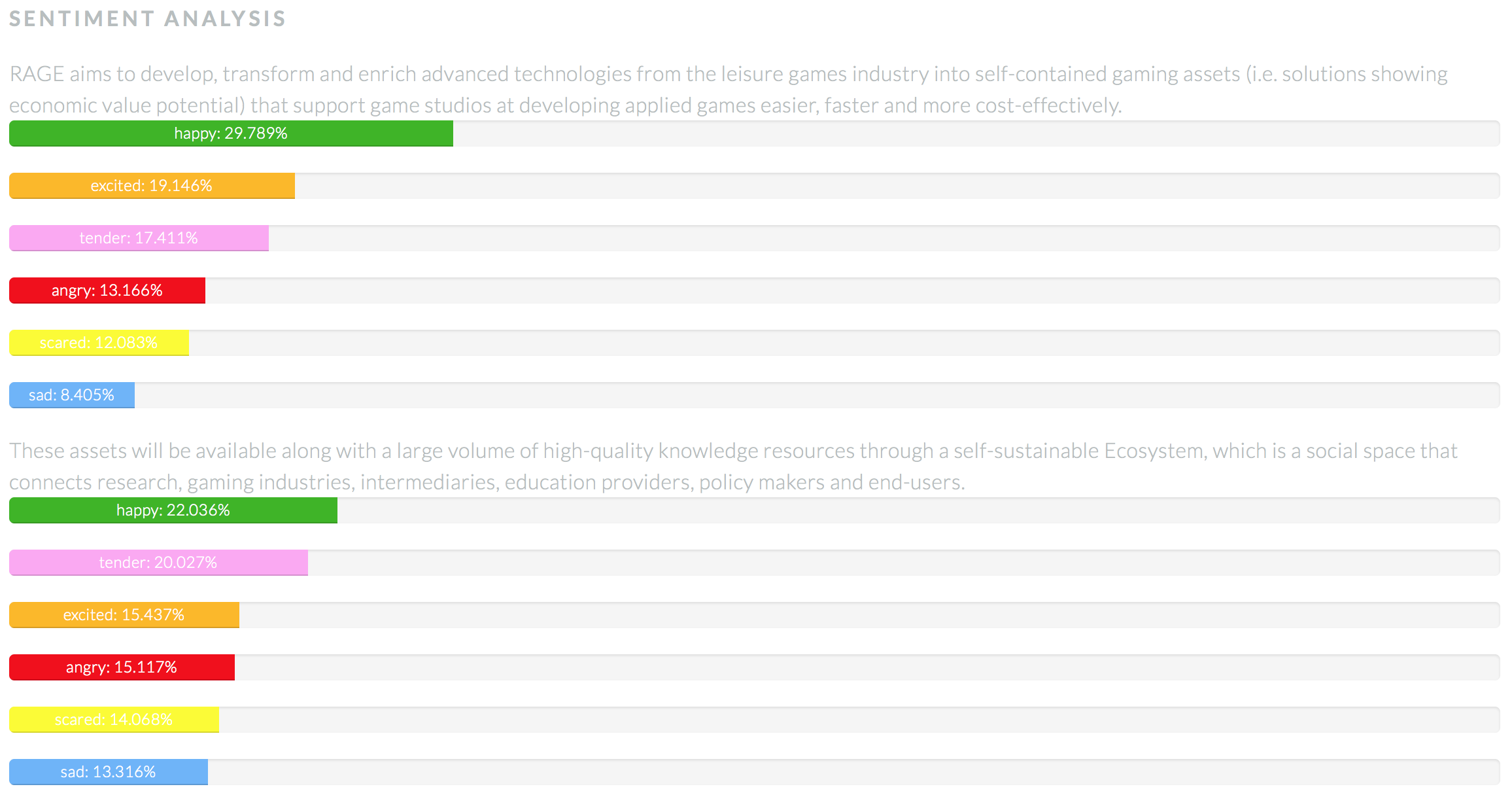ReaderBench - Sentiment Analysis on Texts
- Creator: UPB
- Publisher: Rage project
- Owner: Dascalu Mihai email
Identifies six sentiment valences (excited, sad, scared, angry, tender and happy) of a text as percentage values.
Short non-technical description:
The Sentiment Analysis component which is integrated within the ReaderBench framework, is focused on the evaluation of a given text for the identification of six major sentiment valences (excited, sad, scared, angry, tender and happy).
Given an input text, this component returns a normalised score expressing the strength of each sentiment.
The component is currently available in the following languages: English and French. Dutch and Romanian languages will be available soon.
Technical description:
The Sentiment Analysis component which is integrated within the ReaderBench framework, is focused on the evaluation of a given text for the identification of six major sentiment valences (excited, sad, scared, angry, tender and happy).
The component integrates into our Cohesion Network Analysis model a wide variety of lexical resources for English like General Inquirer, Laswell dictionary, SenticNet, EmoLex, SenticNet, GALC, ANEW, LIWC, and Hu-Liu polarity lists, as well as the sentiment analysis model from Stanford Core NLP based on recursive deep networks.
For French, the component uses Affective norms for French words and emoLex.
Given an input text, this component returns a normalised score expressing the strength of each sentiment.
The component is available in the following languages: English and French. Dutch and Romanian languages will be available soon.
Support levels: The component is available "as is" without warranties or conditions of any kind. Reported bugs will be fixed. Continued support for new versions of the OS and game engines. New features will be added according to the developer's roadmap. New features can be added upon request (requires a service contract).
Detailed description:
The ReaderBench framework can be either cloned from our GitLab Repository or simply used as deployment library.
The Repository contains three projects:
- The ReaderBench Core
- The ReaderBench Desktop Client
- The ReaderBench API
The ReaderBench Core can be accessed to explore the Natural Language Processing functionalities and operations performed by ReaderBench. You may either clone this project and explore its contents, or you can simply use it as a Maven dependency by cloning it from our Artifactory server.
The ReaderBench Desktop Client can be used to test ReaderBench functionalities with the help of a Java Swing interface. This project uses the ReaderBench Core, so you may use it as a guide into integrating ReaderBench in your projects.
The ReaderBench API can be used to explore how the ReaderBench Application Programming Interface works. Similar to the ReaderBench Desktop Client, you may discover how to integrate the ReaderBench Core into a project.
Language: English, French
Access URL: https://git.readerbench.com/ReaderBench/ReaderBench.git
Download: ReaderBench-Sentiment-Analysis-on-Texts.zip
sentiment analysis
semantic models
sentiment valences
Source code:
Documentation:
- http://readerbench.com/docs/sentiment-analysis/manual
- https://git.readerbench.com/ReaderBench/ReaderBench/blob/v3.0/README.md
- https://git.readerbench.com/ReaderBench/ReaderBench/wikis/home
- http://readerbench.com/docs/api
Setup files:
- http://readerbench.com/docs/sentiment-analysis/sdd
- https://git.readerbench.com/ReaderBench/ReaderBench/wikis/how-to/how-to-install-and-run-readerbench
- https://owncloud.readerbench.com/index.php/s/w33mnCcpH1Bp1zs/download?path=/&files=README.txt
Test:
Game development environment: Other
Target platform: Other
Programming language: Java
Version: 3.0
Version notes: Stable version after major project split.
Development status: Completed
Commit URL: https://git.readerbench.com/ReaderBench/ReaderBench/tags/v3.0
Type: Apache 2.0 (Apache License 2.0)





